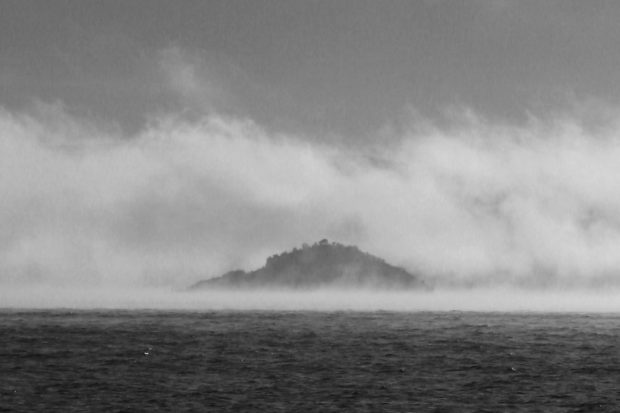
It’s 1 p.m., and the sunlight bleakly concedes to a relentless overcast. In my pickup, I keep my daughter company as she eats her Taco Bell Steak Burrito, its aroma a warming bouquet against the weather. We’re at Blackstone and McKinley. My daughter says, “Dad, a guy’s at your window.” I turn and he’s there suddenly, the way a picture appears when the TV blinks on. I expect him to ask for money right away. He doesn’t.
He’s not yet totally bald and the last of his sandy-colored hair has inched past his collar. His stubble reminds me of Van Goth’s and of his wheat fields. His hands are in his pockets, and the cold becomes visible in his shivering and in the weariness that homelessness bestows on those who, though they have nowhere to go, are in a continuous exodus. He’s tired and slightly bent, his eyes like those of the eternally suffering St. Alphonsus statuary. He wears a thin beige pullover windbreaker, slightly darker cargo pants and running shoes that bear miles and miles of bad road. The attire needs laundering.
He has a cough and he spits every few minutes. At one point, he spits out a chunk of something or other, says “that’s what’s making me cough. Had turkey a little while ago.”
He hasn’t asked for money. I wonder why. Is it because I just want to give him a few bucks so he’d go away so my daughter and I can enjoy the hour in the warm pickup? Is it because it seems that nearly everywhere I go in Fresno, someone in need of food, money, a warm place and an understanding ear asks me for a handout? Or is it because I’m involved in something personal I simply exile them from my consciousness, not letting them approach me for a few bucks? Is it because I have the luxury of a warm vehicle, a warm house waiting for me full of the aromas of coffee, split pea soup and hot French bread, and the fallback a family provides?
I think these things as guilt spreads through me like red algae quietly coating a river or harbor. I’ve come to realize, as if I were again a scared-of-God-kid in a confessional, that I’m concerned about the poor and homelessness mostly when it’s convenient to be so. This is a shot to the most vulnerable part of my catholic soul, that part that I dearly hope contains genuine compassion and the ability to help others as much as I can. Now at Blackstone and McKinley, as my daughter closes her eyes and bites her steak burrito with a relish that reminds me of her as a small child, I look into my eyes in the rear view. There is very little there, in the small isle of stop-time in the pickup, that I care for. The red guilt lessens, but it’s left a stain at my center, one that may be indelible.
I’ve read much about the causes of homelessness, agreed with most of it, cursed government officials who’ve become inured to homeless people’s predicaments. I recall sociologists and their articulate rationales on causes of poverty and homelessness, most of which I looked at as egghead-speak that they use for Ph.D. material and to make academic names for themselves.
Then I think of my dad, a high school educated veteran and cook. He was more than a kind man to most, but he in no way cared for “bums,” those weathered people with barely the light of a small candle in their eyes who asked for money or food at his restaurant.
“If you feed ’em once, they’ll always be askin’ for more.”
Then I think of my mother who, unknown to my father, fed “bums” and hobos who came to our porch. I learned later that these hungry men (I don’t remember seeing women hobos) knew which houses to approach, knew who would offer sandwiches, Kool-Aid, and words as kind and soft as the quiet prayers my mother said for all of us.
The man at my pickup window begins his story, interrupting my flashback. He’d gotten sick, couldn’t pay his mortgage, lost his business, his marriage and kids, the car. And surprisingly, he hasn’t yet asked for money. Then his story becomes less usual. He can’t get VA benefits because he says he wasn’t officially in the military. He says he was on the plane that dropped a nuke in Southeast Asia, that Richard Nixon had ordered the bombing—covertly. He says no newspaper could report it. And that’s the real reason he’s sick, he says: radiation. Not Agent Orange. He coughs, the effort forcing him to back up a little. It’s then, as he shuffles back toward the pickup, I notice he limps badly. His right leg is bowed outward at his knee. And he still hasn’t asked for money.
All the while, his eyes deepen, and he shivers even more. Finally, after telling him that I’m truly sorry about the things that have led him to homelessness, I offer a few dollars. He accepts and adds them to two more that he has in his left hand, counting them like a Vegas dealer. The total was $5. He says he’s trying to raise money to refill a $14 prescription. He shows me a pill bottle, the label aged, smudged and unreadable.
“Thanks, friend, and God bless,” he intones like a priest. And he abandons the window.
My daughter and I watch him walk awkwardly away, almost like a crab.
She finishes her burrito. Finally, we talk about paying the car insurance bill, make a few plans for Christmas and say goodbye at the check cashing place where she loads her Visa card.
She drives off to work. I sit in the pickup for a while, wonder how a day that began full of Christmas hope now wanes like mourners leaving a wake.
